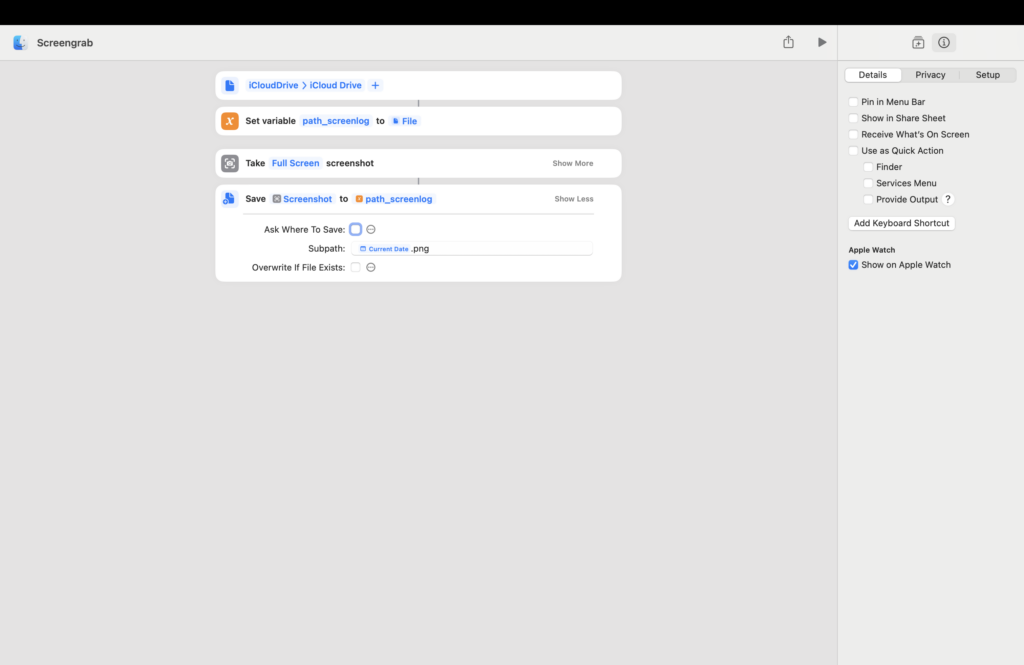Notes on Taking Very Many Screenshots
Microsoft’s CEO Satya Nadella introduced a new feature called “Recall”. The idea is simple: Your Windows computer will take automatic screenshots every few minutes and store them locally on your computer. This will create a memory stream for an integrated AI bot – which in turn means you can talk with it about much of what you did in the past. I guess, the vision is to get helpful answers to questions such as “Show me the small green bag I saw on Etsy last month.” “When was the last time I talked to Kevin?” or “What did I email Cindy that might have made her angry?”
There was some interesting back and forth between People on the Internet either being very enthusiastic about this idea (including Nadella, of course), and others who were rather critical (his competitors, but also many from the privacy and security communities). I don’t have a dog in that race, but I do I think the feature is a fascinating case study on AI, what it stands for, the reactions to it, and its potential. Even more so, it’s a fascinating case study in the kind of questions we might have to ask ourselves, the kind of discussions we might have, cultural change, and how small interventions (and yes, I think it’s a rather small intervention) can have much bigger and weirder effects than we think.
Recall that we had most of these conversations already?
To be upfront: my own first reaction was critical. I am very privacy-conscious, and the idea that ‘someone’ captures my screen every few minutes is disturbing. Sure, it’s voluntary, local, might be encrypted, etc, but that doesn’t change the fact. These things might change. The feature might be turned on with the next update. HR might turn it on. My boss might look at it. Someone’s lawyer might. The police or government might. Some hacker might. The potential that they could is alarming enough.
There are very serious risks, important questions and big consequences about these things. At first I thought my problem was with these issues, but after reflecting a bit, I have to admit my knee-jerk criticism had more to do with aesthetics. It’s zee vibes. There is this devil-might-care move-fast-and-break-things brazenness to all this that repels me and that is emblematic of the AI-hype. The fact that Nadella made himself the figurehead of this idea reinforces this reaction for me.
The image is this: Here is a billionaire who doesn’t care about personal choice and privacy. Who’s image of the world is one of simple transactions in which second or nth order consequences are either none-existent or other people’s problems. Hackers, surveillance, human error? Who cares if this thing helps you to find “the nice blue bag I saw about a week ago in Vogue” a bit earlier. “Have fun staying poor, NPCs” his acolytes shout around him while he is Yoloing into this bonanza. This is unfair of course! A testimony to my own ideology! I didn’t even watch the video of him (I don’t have to!). I only skimmed their “privacy statement” as it as expected bored me to sleep. But hey, this is social media, and the vibes is what I want to address here.
My guess is that (a) these things boil much hotter in my circles (very online or not-online-at-all and very privacy-conscious people) and (b) Microsoft didn’t truly anticipate these strong reactions. Why? Because looking at it, Recall can best be seen as a fast prototype, a very simple hack with the potential of a quite surprising power. Next to the whole idea of “AI assistants”, which is a fancy term for integrating LxMs and a nice interface into your OS while hopefully thinking about privacy a bit, Recall is basically this, a short shortcut plus smart prompt “architecture” around it, run automatically every now and then:

Logs, LxMs, and not-so-long-forgotten debates
So taking a deep breath, a step back, and putting my own aesthetic preferences aside, what’s left?
There are two parts to the ‘input’ side of Recall, the log (of screenshots), and search. Let’s focus on the log for now, as the search is ‘just’ the general AI thing – and in the end it’s not so important whether you through a gigabyte of dog pictures or screenshots at the LxM and ask stuff about it. Also, I think it’s the log that was irritating me so much.
There are also two parts to the ‘output’ side to Recall, let’s call them ‘hard’ issues of privacy, security, and individual rights, and ‘soft’ issues of individual choice, practices, and cultural issues like etiquette. Let’s focus on the soft part. There are very valid and important security, privacy and individual right concerns here, and the naiveté Microsoft projects towards all this was what felt so ignorant and disrespectful about this all. But I too am not an expert on privacy, and these issues too are not actually new. Work logs are a very old category and there has been much debate around it.
The most interesting new thing about Recall (for me) is the naively enthusiastic/brazen/careless way it’s thrown at millions of people. This decision bulldozes over individual decisions that are much more nuanced, entangled, and subtle than anything we will get to in the public discourse around this in the next weeks and months. This is a very speculative statement of course, so let me share a bit of personal background and reflection.
A quantified-self intervention for the masses
The question that fascinates me around Recall is how the idea of (local, voluntary, encrypted self-surveillance) changes behavior. In this sense – and considering the risks, this seems to be the overall best case scenario – Recall is basically a ‘quantified self’ intervention forced on millions of people.
Personally, I experimented quite a lot with ideas such as self-logs in the last years. As a statistician and researcher, I love data. Also, I had some challenges with focus and productivity for which honest objective data about what I do when was an important starting point to find solutions. I thought long and hard about what kind of data I want to gather, why, what I like about it, what I don’t like about it, and what I want to do with it… all questions anyone clicking on the “Let me try this tool! #yolo”-button will probably not ask themselves.
Probably the most powerful tool I tried was a time-tracking tool that allowed me to analyze my computer use on a minute-by-minute level. Think of it as Screen Time on steroids. Making that decision was quite daunting. Here am I, producing a log of my action and inaction over maybe 30-50% of my waking hours. Imagine one day having a Real Enemy who would get hold of such data!
What gave me peace of mind was: (a) The data was local and I was in complete control of it. (b) The data was simple, which app and maybe which URL was active at what time. Background windows would not be measured. (SN: Not a good feature for a productivity intervention ;)). (c) The data was esoteric, think app-specific data base with obscure csv files. (d) The app allowed to veil certain activities. (e) No-one knew I was doing this. Now think how these apply to the data collected by Recall.

A Panopticon of your choosing
The Panopticon was a special kind of prison in which the prison cells are positioned in a circle around a single watchtower. The idea is that while it’s hard for the wards to watch every inmate at all times, the fact that the inmates know they might be watched at any item already changes their behavior. As such, the Panopticon has become a powerful metaphor for the submissive effects of surveillance.
Building a constant log of what you do when using your computer too has a Panopticon-effect. Just knowing that this log is created and will exists changed my usage behavior. For me this was a deliberate intervention to increase my productivity! (a) In productive times, I would procrastinate less, trying to keep my log ‘clean’. (b) I would try to shift usage to activities I graded as more productive, work of course, but also stuff like movies instead of series instead of youtube. Good! (c) I would try to ‘hide’ certain activities from it, e.g., shifting videos to my tablet (also good & effective)… or at least towards a window in the back (less effective).
Third, every coin has a flip-side: (a) While I became more productive in good times, in times of lower productivity, knowing the log exists and is created strengthened my feelings of repulsion towards my laptop as I knew it ‘remembered’ all those bad hours. Regularly deleting all of those traces was a good yet important fresh start! (b) I don’t have OCD… yet I still felt the urge to ‘organize’ the log somehow. Labeling, tagging, … I guess whatever Microsoft’s ‘assistant’ will be called it’ll do that… and kids these days don’t know files exists… still, I wonder how much time people will spend globally going through their screenshots…
What fascinated me was that these consequences were quite strong considering how ‘small’ the actual intervention was. Sometimes installing app is not about installing only an app. So maybe offering a feature to a billion people is also not about the feature alone?
Showing good etiquette when big brother is watching
To illustrate this point, consider one more thing. Have you found yourself in the situation of having a video call with a loved one and thought about taking a screenshot? Let’s say with only the best intentions, to have a memory of a nice moment with a loved one. How did it feel? Was it weird? Did you wonder whether they would here the 📸-sound or see a short flash on their screen, maybe get a notification? Did it feel rude? Did you want to ask them?
The way I think about it, these questions are important and a testimony to etiquette. Etiquette is important, it’s the fabric on which daily interactions are built. And this too is a problem I have with Nadella and their decision – they single-handedly overwrite major areas of social contracts and etiquette.
From now on, you can assume: The book case in the background of your call, your child you show your uncle during a call, the make-up of your room, the people with whom you appear in a call – all those things will be stored. On other peoples’ hard drives. And the very bot that should help you to remind “the nice blue mug from Etsy two weeks ago” – or it’s bigger brother with your local security service will be able to show “every book Ben has in his book case, the people in his house, and its likely location guessed by what’s visible through the windows.”